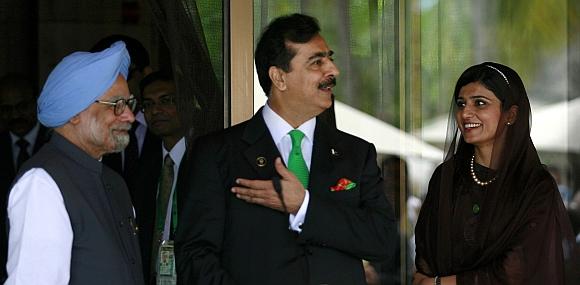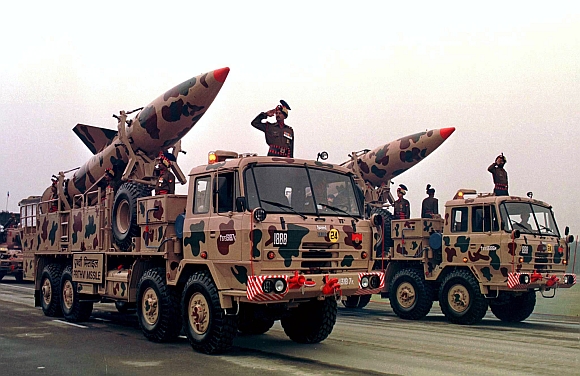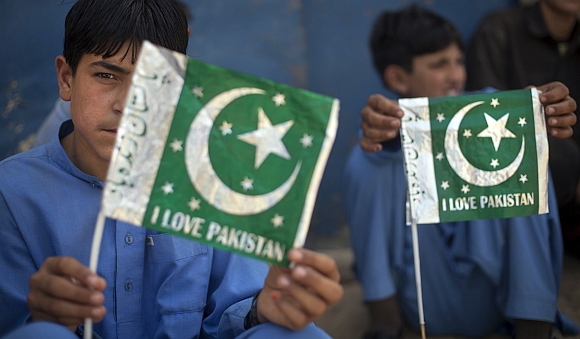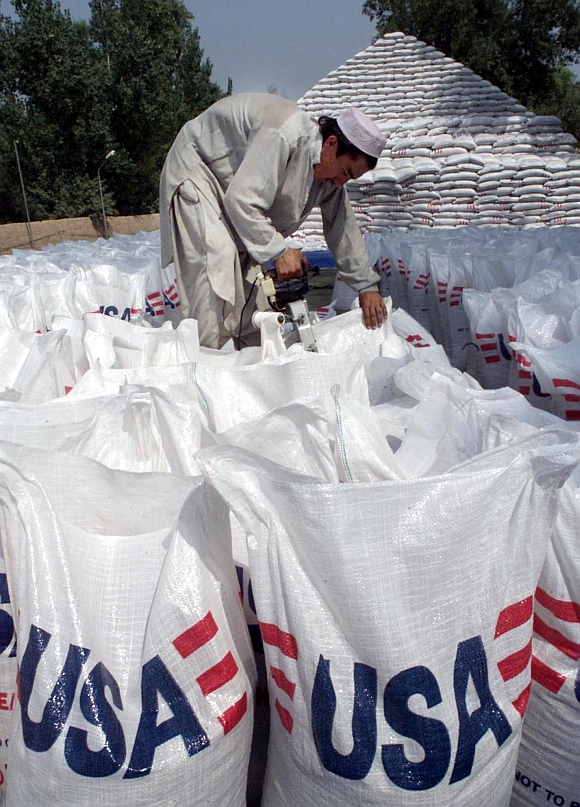Photographs: Reuters
Colonel (Dr) Anil Athale (retd) wants to put Pakistan's peace offensive in perspective
To the chorus of the usual suspect television news brigade in New Delhi, Pakistan seems to have launched a 'Peace Offensive' of sorts vis a vis India. After a delay of 15 years it now wants to reciprocate by granting the Most Favoured Nation status to India for trade. For the uninitiated, MFN is an obligation under the World Trade Organisation regime.
The fact is that India did not make it an issue all these years in order not give another excuse to the 'Hate India' brigade in Pakistan. But that still leaves open the question as to why Pakistan has begun to sing the peace tune now! And if one is to believe the Pakistan prime minister, then even the Pakistan Army (a self-confessed India-centric entity) is onboard. There are already calls to liberalise the visa regime, the 'candle brigade's' panacea for all problems.
...
Acquisition of N-weapons in the 1980s marks biggest failure of Indian diplomacy
Image: Transporters mounted with India's surface-to-surface Prithvi missiles make their way past a saluting base during the annual Army Day parade in New DelhiPhotographs: Reuters
The knee-jerk Indian reaction is a cause for worry. Recent disclosure in media shows that in the late 1970s, the Ministry of External Affairs had actually assessed that General Zia Ul Haq was a 'moderate' and was unlikely to overthrow Zulfikar Ali Bhutto and definitely not hang him, as he eventually did.
Under Jagat Mehta as foreign secretary, the Indian establishment was spectacularly wrong in its assessment of Pakistan. Failure to prevent Pakistan's slide into fundamentalism and acquisition of nuclear weapons in the 1980s (though it tested in 1998) marks the biggest failure of Indian diplomacy in the 20th century. It is necessary to be cautious and understand the logic behind the sudden Pakistani volte face.
The occurrence is an as unusual as a leopard changing its spots, a tiger turning vegetarian or a dog's tail straightening! But despite an extensive search on the internet, no such incidents have been reported from anywhere else! Let the logic be explained. No sane Indian (barring lunatics on the far right) would question that peace with a nuclear-armed Pakistan is desirable. Yet, realism dictates that if wishes were horses then Pakistan would ride to peace! What is the reality of Pakistan today?
A brainwashed population that believes India was part of Pakistan for thousands of years, Mohd Bin Kasim was the first Pakistani, most Pakistanis are migrants from Arabia, Turkey, Iran and Central Asia and India exists only for the sole aim of destruction of Pakistan and Islam.
Anti-India sentiment continues to be injected in Pakistani school children
Image: Schoolboys hold flags while welcoming journalists and army officials who arrived on scheduled trip to military-funded school in DawazaiPhotographs: Reuters
Since December 1988 (Benazir Bhutto-Rajiv Gandhi's Islamabad declaration) and countless reports and studies (including by this author) the 'hate India/Hindus' poison continues to be injected in Pakistani school children (not just madarassas but ALL schools).
Pakistani population is growing at one of the highest rate in world with per woman fertility at 5.4 children. With economy growing at less than 2/3 percent, there is increasing poverty and destitution. But the focus of Pakistani state is on 'jihad' to wrest Kashmir from India and obtain strategic depth in Afghanistan.
Pakistan continues to be ruled by feudal elite and the troika of landlords-mullah and the army. Liberal elements are on the fringes and have no influence either with the masses or the armed forces.
Then what explains the current moves to begin trade relations and toned down rhetoric? A clue to this was found in the numerous opinion columns of the Pakistani news media. Not a single day passes without some or the other foreign or security expert writing on how to mend the United States-Pakistan relations. It appears that Pakistani establishment, including the armed forces, are running scared due to change in American policy towards Pakistan.
Without US economic aid, Pakistan is on a verge of economic collapse
Image: An worker arranges bags of wheat at the United Nations World Food Programme store in PeshawarPhotographs: Reuters
The Americans hold a whip hand as concerns the Pakistani economy. Just sample this:
- Every Pakistani man, woman and child is indebted to the tune of Rs 61,000 while the government of Pakistan continues to borrow additional funds at the rate of Rs 500 crore a day.
- Four out of every 10 Pakistanis have fallen below the poverty line. The total now stands at an estimated 72.9 million below the poverty line.
- Foreign Direct Investment has suffered a drastic fall over a short period of time from $5.4 billion in 2008 to around 1 billion in 2011.
- As per the 2011 Legatum Prosperity Index, Ethiopia, Zimbabwe and the Central African Republic are the only three countries worse off than Pakistan.
(Figures based on article in The News, dated November 20)
Without the American economic aid, Pakistan is on a verge of economic collapse.
Fear of losing out to India has prompted Pak Army to sing peace tune
Image: A Pakistani Ranger and an Indian Border Security Force officer shake hands during the daily parade at the Pakistan-India joint check-post at Wagah borderPhotographs: Reuters
But the Pakistan military has seldom been worried about the welfare of citizens or national economy. Their worry and consequent 'peace posture' towards India stems from possible American cutoff of military spares. It becomes a double whammy as Pakistan suspects that the US has 'finally' began to help Indian armed forces with advance conventional weaponry. Pakistan may well be on the verge of losing its edge in conventional (and usable) forces over India.
This needs some explaining. For too long Pakistan has created a myth of Indian 'Goliath' based on overall size of the armed forces. This is untrue as a large proportion of Indian forces are tied on the China border. As a matter of fact, India has never had more than 1 is to 1.5 numerical advantage over Pakistan. But this has been consistently neutralised by the advanced American weaponry supplied to Pakistan, first as part of anti-Soviet alliance, then due to her role in Afghan war and since 2001 as a price for the 'war on terrorism'.
The following examples will show the effect of American military aid,
- Pakistan had 155 mm guns way back in 1965, India acquired these in 1987 (the Bofors guns).
- Pakistan had fire-finder radars since 1980s, India got its first effective fire-finder radar in 2003.
- Pakistan has helicopter gunships, TOW anti tanks missiles, stinger anti-aircraft missiles while India does not have an equivalent other than obsolete Soviet arms.
The Pakistani military is well aware of the plight of the Iranian armed forces after the break with US. While there is brave talk of turning to China, every Pakistani general knows that the Chinese arms are no match to the sophisticated American arsenal. It is this fear of losing out to India for the first time in last 60 years that has prompted Pakistani Army to sing the peace tune.
It hopes to thereby lull the Indian leadership always reluctant to modernise armed forces, to go slow. The loss of a military edge by Pakistan will also force it to shut its jihad project in Kashmir. Peace overtures is its tactic to postpone the inevitable.
Colonel (Dr) Anil Athale (retd) is coordinator of the Pune-based Indian Initiative for Peace, Arms-control & Disarmament.





article